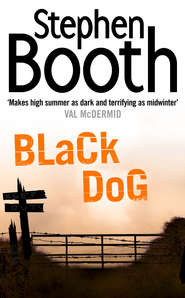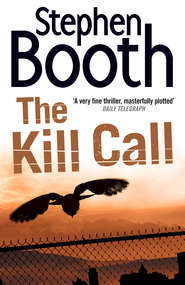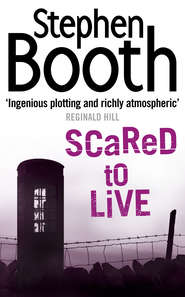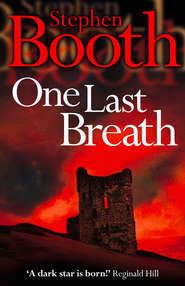По всем вопросам обращайтесь на: info@litportal.ru
(©) 2003-2024.
✖
Dancing With the Virgins
Автор
Год написания книги
2019
Настройки чтения
Размер шрифта
Высота строк
Поля
Though it was only two o’clock, it would be starting to go dark in a couple of hours’ time. For a few days now, Mark had noticed that peculiar half-light, like full moonlight, that came at five o’clock in the afternoon, when all the colours seemed to change and glow for a few minutes before fading into the darkness. The turning back of the clocks at the end of British Summer Time always worried the Peak Park Rangers. Walkers were liable to miscalculate and still be on the hills when it went dark.
The afternoon was turning cold, but Mark didn’t feel the chill. The red fleece jacket he wore proudly, with its silver Peak Park insignia, kept him warm. It was also a reassuring sight for the visitors a Ranger came across – those who were lost and bewildered, exhausted or injured, or simply inadequately dressed and too poorly equipped for walking the moors. The sight of the red jacket was like a friendly beacon. It meant a Ranger approaching.
Jenny Weston had been in the act of smiling when she died. Her smile had stiffened and shattered, twisting into a grin of fear as the knife slipped under her ribs.
The blade was sharp, tungsten coated, and with a lethal tip. It slit the cotton of her T-shirt and sliced easily through her skin and a layer of subcutaneous fat as it thrust towards her heart. A small patch on the front of her T-shirt turned red and a single spurt of blood splashed on to the handlebars of the Kokomo.
As soon as the knife was withdrawn, the wound closed and ceased to bleed on the outside. Jenny looked down, astonished, and pressed her hand to the red patch. Inside her ribcage, her heart sac was already filling with leaking blood; the pressure of it squeezed her heart and constricted its movement. Then her left lung deflated and a gush of fluids filled the cavity. She began to feel light-headed; her hands and feet turned numb, and her legs lost the strength to hold her body upright.
She made no resistance as she was grasped under the armpits and dragged across the clearing, with her heels leaving trails in the sandy soil. As fresh blood failed to reach her brain and extremities, her skin turned a dirty white; her legs and belly looked like lumps of boiled fish as they were deliberately exposed to the light.
The blade of the knife left a red smear where it was wiped on the grass. From the handlebars of the bike, a small trickle of blood had run down on to the front wheel. It dripped slowly from spoke to spoke, already darkening and thickening in the air, until it was absorbed into the ground.
By the time her attacker had finished, or not long after, Jenny Weston was dead.
Mark knew it happened sometimes, but it was such a pointless thing to do. Mindless and irresponsible. Now and then the Ranger briefings mentioned a bike that had not been returned to the hire centre. Hirers had to give proof of their identity and leave a name and address, as well as a £20 deposit, so it was hardly worth trying to get away with a mountain bike, considering how easily you would get caught. But sometimes there was one who took the bike away with them. Occasionally, they simply abandoned it on one of the tracks, in a car park, or up here on the moor, like this one. None of it ever made sense to Mark.
The sight of the Kokomo under the gorse bush angered him unreasonably. Its presence was like a violation – the evidence of selfish humanity intruding into his world, like children pawing his most precious possessions with grubby fingers. The bike had been treated as just so much rubbish.
Then Mark looked more closely. A streak of red had stained the canary yellow paintwork of the front stem and left rust-like spots on the spokes. He shivered with misgiving and fingered the radio in his pocket. Suddenly he wished he hadn’t come out alone, after all. There was no reassuring presence alongside him, no Owen there to know exactly what to do.
With a shaking hand, Mark made a note of the colour, model and number of the bike, crumpling the pages of his notebook in his haste to get it out of his pocket. The act of writing made him feel better, more in control, as if the ink marks on the page had magically brought a familiar voice from the air: ‘Observe, keep a note, report back.’
‘Yes, Owen,’ whispered Mark.
Feeling the sweat drying on his forehead and the back of his neck, he forced himself to walk past the bike to where the stones were clustered among the spindly birches. Somebody had lit a fire here recently, leaving scorched earth and a pile of white ash. People were always lighting fires near the Virgins, as if they thought the flames might melt their stony hearts. At the midsummer solstice, there were hundreds of folk up here at night, and they did a lot more than light fires.
Mark stopped abruptly as he looked into the circle. The sensations that came reminded him of the terrors of his puberty, the physical sickness and the guilt. He tried to concentrate on studying the ground, to look for evidence of bike tracks or footprints. He tried to think about casting around for telltale objects that might have been dropped by someone who had been in the area. I’m observing, he told himself. I must observe. Be professional and calm, and don’t rush into anything.
But he couldn’t keep up the pretence for long. His eyes just wouldn’t focus on anything else. With shameful fascination, Mark found his attention drawn to the centre of the stone circle, where the white shape lay in such startling, rousing incongruity.
‘Oh, Jesus.’
The body of the woman sprawled obscenely among the stones. Her half-naked torso had been flung on the rough grass, her arms and legs twisted in provocative gestures. Her right knee was lifted high, to the level of her waist, and her left leg was stretched taut, as if she might be about to spring into the air.
Mark could see every detail of the muscles in her legs, the tendons rigid under the skin at the top of her thigh, the faint crinkling of cellulite on her hips. Her pose was a caricature of life, a cruel parody of flamboyance and movement. Her hands were tilted at the wrist, her toes pointed downwards, and her head nodded to silent music. She was spread against the ground in a final arabesque, in a fatal pirouette, or the last fling of an abandoned tango.
Mark wondered whether to write it down. But it sounded too strange, and his hand wouldn’t write any more, anyway. Instead, he repeated it to himself, over and over, in his head. A dead woman dancing. She looked like a dead woman, dancing.
2 (#ulink_346fa94b-e48e-51f6-a4a1-f2fc965f531f)
Fifteen miles to the north, in the town of Edendale, the battle had been going on for an hour and a quarter already. The police officers in the front line were battered and breathing hard, their faces swollen with exertion, and their hair stuck to their foreheads with sweat. One or two had their shirts ripped. Another had blood trickling from a cut on his eye.
Detective Constable Ben Cooper could see his colleague, Todd Weenink, deep in the thick of it. Weenink had two PCs from the Tactical Support Unit close on either side of him, and there were more men coming in from behind to assist them. They looked exhausted, their expressions grim, but determined. They were struggling against the odds, fighting a battle of containment that they were constantly in danger of losing.
The students were charging forward in a solid mass, forcing the police to give ground under the onslaught. In the melee, close up, anything could be happening – a poke in the eye, a boot in the crutch, teeth sinking into an ear. The police had not been issued with riot shields or helmets today; there was no body armour, no snarling Alsatians or horses to keep the students at bay. There had been no authority given for the use of special weapons, no tear gas canisters held nervously in reserve.
In addition, the police had to face a ceaseless barrage of noise – chanted slogans, shouts of abuse and a constant stream of profanities from a hostile crowd.
Cooper pulled his hands out of his jeans pockets and turned his coat collar up to try to shut out the cacophony. If he could, he would have closed his eyes, too, to avoid seeing the slaughter, to stop himself from imagining the consequences if the police line collapsed. In another moment, the day could end in total humiliation for Derbyshire Constabulary E Division. And not a single arrest made so far.
‘What are we going to do, Sarge?’ he said.
Detective Sergeant Rennie was an old hand. He had seen it all before. He rubbed his jowls, pulled his anorak closer around his shoulders, and winced as a PC went down and was trampled underfoot.
‘Conduct a survey,’ he said. ‘We’ll send out a questionnaire.’
Cooper nodded. ‘I suppose so. But it’s a bit pathetic, isn’t it?’
‘We’ll make sure there are lots of tick boxes to fill in.’
‘Even so …’
Rennie shrugged and sighed. ‘It’s all we can do, Ben. Otherwise, we just have to sit back and let it happen.’
The police formed a wall and turned to face their attackers again. Beyond the opposing lines, Cooper could see the main buildings of the High Peak College campus, set on the lower slopes of the hill. They looked down on Edendale like benign giants, the educational heights of the Eden Valley.
He began to search his pockets for a packet of mints to take the taste of nausea from his mouth. He had a lot of pockets – in his jeans, in his checked shirt, on the inside and the outside of his waxed jacket. But all he found was a scatter of cashpoint receipts, two empty shotgun cartridge cases and half a packet of dog biscuits.
Cooper knew there was more than just education that went on in those college buildings on the hill. He had been there himself, for long enough to collect the A-levels he needed to get into the police service. His fellow students had accused him of being single-minded, as if his determination made them guilty about their own pursuit of parties and casual sex. But there had been a demon driving Ben Cooper that his contemporaries would never have understood – a jealous God who would not have tolerated parties.
Dave Rennie sat back comfortably in his seat and unscrewed the top of a vacuum flask. He offered Cooper a plastic cup, which he refused as soon as he got a whiff of the metallic tang of the coffee. The sergeant’s expression was serious, his forehead creased with anxiety, like a man with a great responsibility on his mind.
‘You see, if they get rid of the kitchen and sack the canteen staff, that means they’ll put vending machines in instead,’ he said. ‘And then what would happen? I mean, would anybody use them? There’s no point in spending money on vending machines if they don’t get used. It would look bad in the budgets, wasting money at a time like this.’
Cooper watched Todd Weenink duck his head and drive his shoulders forward to meet a wiry-haired youth who’d been tormenting him all afternoon. There was a thud as their skulls connected and a scuffing as their feet lashed out.
The crowd behind Cooper began yelling. Then the police back-pedalled. Officers fell and were trampled as they lay on the ground. But Weenink broke away and looked around, bemused. His eyes were dazed, as if he might have taken a knock on the head. Then he looked up and caught sight of a student running past him, and made an instinctive grab. The student’s legs folded beneath him under the impact of Weenink’s sixteen stone, and they both sprawled in the mud, exhausted and gasping.
Cooper smiled. Quite by chance, it had been the right student Weenink had flattened. The High Peak College wing-threequarter happened to be in possession of the ball, and had been racing for the touchline, within seconds of scoring the winning try of the match. Even while the two opposing players were struggling to get up again from the tackle, the referee blew the final whistle. The match had been saved: 12–10 to Edendale Police.
‘Thank God for that,’ said Cooper.
‘Honour preserved, I suppose,’ said Rennie, putting away his flask.
‘I don’t know about that, Sarge. But our lot always trash the bar if they lose.’
Cooper left the touchline and headed for the clubhouse. In his early days in E Division, they had tried to recruit him to the rugby team. They had thought he looked tall and fit enough to be an asset, but had accused him of lacking ruthlessness in the ruck. Now his job was to order the jugs of beer for the changing-room celebrations. Loyalty to your colleagues meant doing such things on a Sunday afternoon, even when you would rather be at home watching videos with your nieces.
After ten years, Cooper was able to look back on his days at High Peak College with some nostalgia. His life had possessed a definite purpose then. Succeeding in his exams had been his role in life, and joining the police his destiny. The feeling had stayed with him through his time as a uniformed constable on the beat; it had followed him as he moved into CID and began to learn a different way of policing. His progress had been watched every inch of the way, and mostly approved of. Mostly. The times when he had made mistakes or expressed doubts were still imprinted in his memory.
Then, two years ago, everything had changed. With the violent death of his father, Police Sergeant Joe Cooper, a prop had been knocked from under him, and a great weight had been lifted from his back. His guiding hand had been taken away, and his life had been given back to him. But it had already been too late for Ben Cooper. He had become what his father made him.
‘So that’s why we have to do this Vending Machine Usage Survey,’ said Rennie, pronouncing the capital letters carefully as he walked at Cooper’s shoulder. ‘To get an idea of the possible take-up on the proposed new refreshment facilities. It’s so that somebody in Admin at HQ can make an informed decision. A decision supported by constructive feedback from the customer base.’
Cooper could practically see the internal memo that Rennie was quoting from. The sergeant had coffee soaking into his moustache. He was wearing knitted woollen gloves, for Heaven’s sake. He looked like somebody’s granddad on an off-season outing to Blackpool.
Cooper was conscious that his own thirtieth birthday was approaching next year. It loomed in the distance like a summer storm cloud, making him feel his youth was nearly over before he had got used to being in his twenties. One day, he could be another Dave Rennie.











